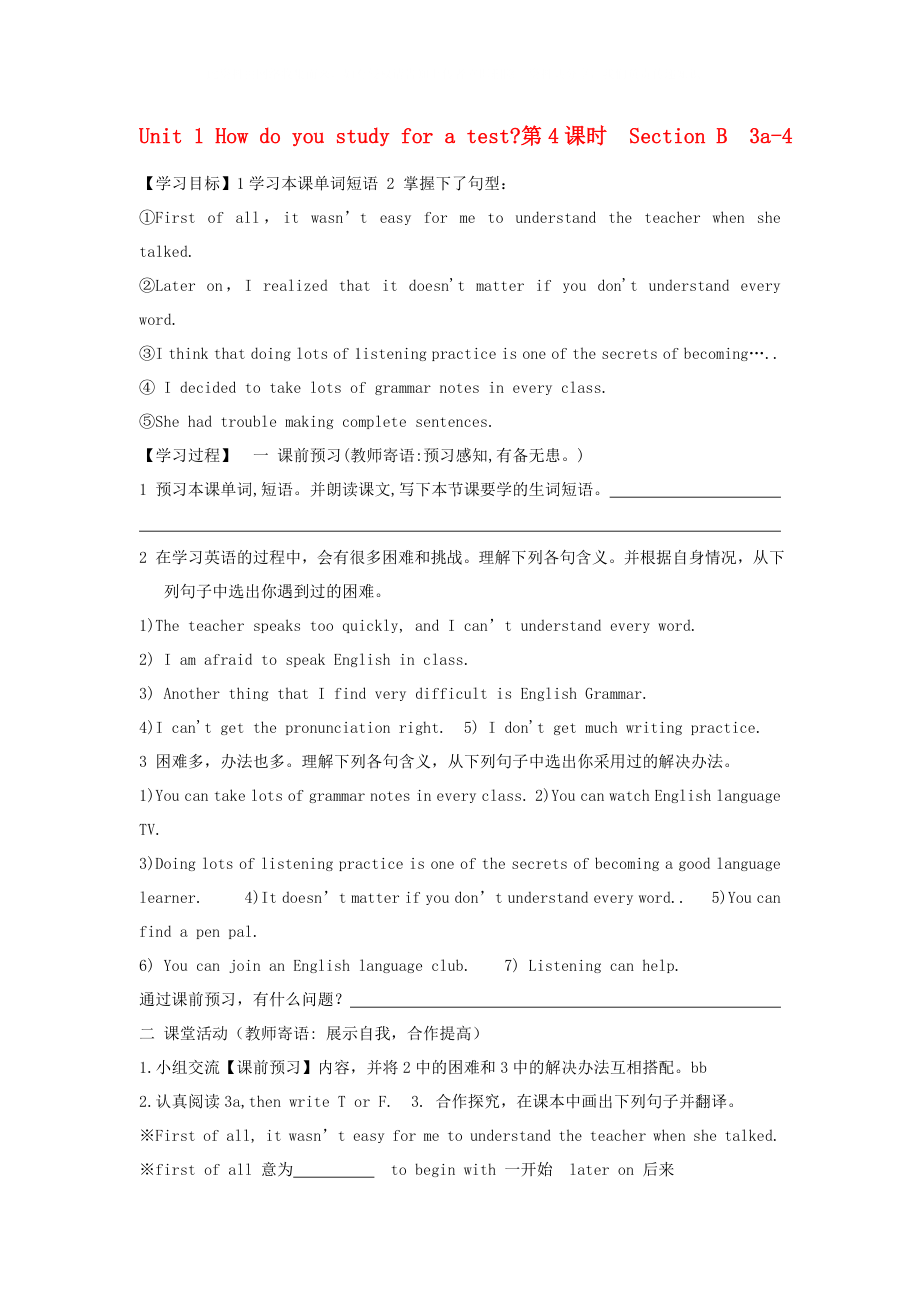《黑龍江省黑河市愛輝鎮(zhèn)中學(xué)九年級(jí)英語(yǔ)全冊(cè) Unit 1 How do you study for a test 4導(dǎo)學(xué)案(無答案) 人教新目標(biāo)版》由會(huì)員分享�����,可在線閱讀����,更多相關(guān)《黑龍江省黑河市愛輝鎮(zhèn)中學(xué)九年級(jí)英語(yǔ)全冊(cè) Unit 1 How do you study for a test 4導(dǎo)學(xué)案(無答案) 人教新目標(biāo)版(3頁(yè)珍藏版)》請(qǐng)?jiān)谘b配圖網(wǎng)上搜索。
1����、此資料由網(wǎng)絡(luò)收集而來,如有侵權(quán)請(qǐng)告知上傳者立即刪除����。資料共分享,我們負(fù)責(zé)傳遞知識(shí)�。
Unit 1 How do you study for a test?第4課時(shí) Section B?3a-4
【學(xué)習(xí)目標(biāo)】1學(xué)習(xí)本課單詞短語(yǔ) 2 掌握下了句型:
①First of all,it wasn’t easy for me to understand the teacher when she talked.
②Later on��,I realized that it doesn't matter if you don't understand every word.
③I think t
2���、hat doing lots of 1istening practice is one of the secrets of becoming…..
④ I decided to take lots of grammar notes in every class.
⑤She had trouble making complete sentences.
【學(xué)習(xí)過程】 一 課前預(yù)習(xí)(教師寄語(yǔ):預(yù)習(xí)感知,有備無患���。)
1 預(yù)習(xí)本課單詞,短語(yǔ)。并朗讀課文,寫下本節(jié)課要學(xué)的生詞短語(yǔ)�。
3、
2 在學(xué)習(xí)英語(yǔ)的過程中��,會(huì)有很多困難和挑戰(zhàn)�����。理解下列各句含義。并根據(jù)自身情況��,從下列句子中選出你遇到過的困難�����。
1)The teacher speaks too quickly, and I can’t understand every word.
2) I am afraid to speak English in class.
3) Another thing that I find very difficult is English
4�、Grammar.
4)I can't get the pronunciation right. 5) I don't get much writing practice.
3 困難多,辦法也多�����。理解下列各句含義��,從下列句子中選出你采用過的解決辦法����。
1)You can take lots of grammar notes in every class. 2)You can watch English language TV.
3)Doing lots of listening practice is one of the secrets of becoming a good lang
5、uage learner. 4)It doesn’t matter if you don’t understand every word.. 5)You can find a pen pal.
6) You can join an English language club. 7) Listening can help.
通過課前預(yù)習(xí)�,有什么問題?
二 課堂活動(dòng)(教師寄語(yǔ): 展示自我���,合作提高)
1.小組交流【課前預(yù)習(xí)】?jī)?nèi)容����,并將2中的困難和3中的
6�����、解決辦法互相搭配���。bb
2.認(rèn)真閱讀3a,then write T or F. 3. 合作探究�����,在課本中畫出下列句子并翻譯��。
※First of all, it wasn’t easy for me to understand the teacher when she talked.
※first of all 意為 to begin with 一開始 later on 后來
※Later on�����,I realized that it doesn't matter if you don't understand every word.
later /later
7���、 on 1ater作副詞用,意為“后來��;以后”�����,以現(xiàn)在或以前的時(shí)間為基準(zhǔn),常用于一般將來時(shí)或一般過去時(shí)��。later可以和一段時(shí)間連用���,構(gòu)成“時(shí)間段+later"結(jié)構(gòu)�����,常用于一般過去時(shí)��;但是later on只可單獨(dú)使用���,不能用于“時(shí)間段+later on"結(jié)構(gòu)。
【跟蹤訓(xùn)練】一星期后他闖來了���。He came back .
※I was also afraid to speak in class. afraid�����,意為“害怕的”����。固定搭配有“be afraid of”和“be afraid to”。be afraid of 意為“害怕”�,后跟 ;be
8�����、afraid to意為“害怕����,不敢”����,后跟 。二者有時(shí)可互換���。練習(xí): ①她怕蛇��。She snakes.
※Don't be afraid to ask for help.(同義句) Don't be afraid for help.
※在這篇文章中�����,出現(xiàn)了許多表示順序或承接的連詞或詞組��。如:?first?of?all?���。在寫作中����,正確使用連接詞�����,會(huì)使文章增色不少���,提高檔次�����。請(qǐng)你來總結(jié)一下�,在這篇文章中還有哪些類似詞語(yǔ):
9��、
※ I think that doing lots of listening practice is one of the secrets of becoming a good language learner. (1) one of…意為 ��,其后接可數(shù)名詞的 形式����,如有形容詞修飾名詞時(shí)�����,形容詞用 形式��。如:姚明是世界上最受歡迎的籃球運(yùn)動(dòng)員之一��。
Yao Ming is the most popular basketball players in the world.
one
10�����、of the+形容詞的最高級(jí)+名詞復(fù)數(shù),?最…之一��。Shanghai is one of the biggest cities in China.
※So I decided to take lots of grammar notes in every class. decide to do sth. 決定做某事。
※My teacher is very impressed.
※She had trouble making complete sentences. have trouble doing sth.做某事有困難����。
三 檢測(cè)反饋
單項(xiàng)選擇1.The best way
11、to learn English grammar is to ____in every class.
A .taking notes B. take notes C. take notes D. took notes
2.She is shy ,so she is afraid ___in front of other people.
A. to speak B. to speaking C. of speak D. of speaks
3. Do you have trouble ___grammar ? the teacher asked. A. learn B. learning
12����、 C. learnt D. learned
4.First ____all, you should understand English. A. at B. by C. in D. of
5.Don't laught ____others who has made mistakes,you make mistakes too. A.to B.at C.of D.in
根據(jù)漢意完成句子
1.因此我決定每節(jié)課多做語(yǔ)法筆記So I to of grammar in every class
2.我也害怕在課堂上發(fā)言,因?yàn)槲乙詾橥瑢W(xué)們會(huì)
13��、笑話我
Also l was speak in class, because l my classmates might me
3.你會(huì)編寫完整的句子嗎����?Can you some sentences?
4.How do we our ? 我們?nèi)绾翁幚磉@些棘手的事情呢����?
5.隨后�����,我意識(shí)到如果你聽不懂每個(gè)詞也沒關(guān)系
, l that if you don′t understand every word.
三.寫作:寫一寫你在學(xué)習(xí)英語(yǔ)過程中有哪些困難�����,(可按照聽�、說、讀���、寫幾個(gè)方面)��,你又是如何用不同的方法來解決這些問題去提升你的英語(yǔ)水平�。
 黑龍江省黑河市愛輝鎮(zhèn)中學(xué)九年級(jí)英語(yǔ)全冊(cè) Unit 1 How do you study for a test 4導(dǎo)學(xué)案(無答案) 人教新目標(biāo)版
黑龍江省黑河市愛輝鎮(zhèn)中學(xué)九年級(jí)英語(yǔ)全冊(cè) Unit 1 How do you study for a test 4導(dǎo)學(xué)案(無答案) 人教新目標(biāo)版

